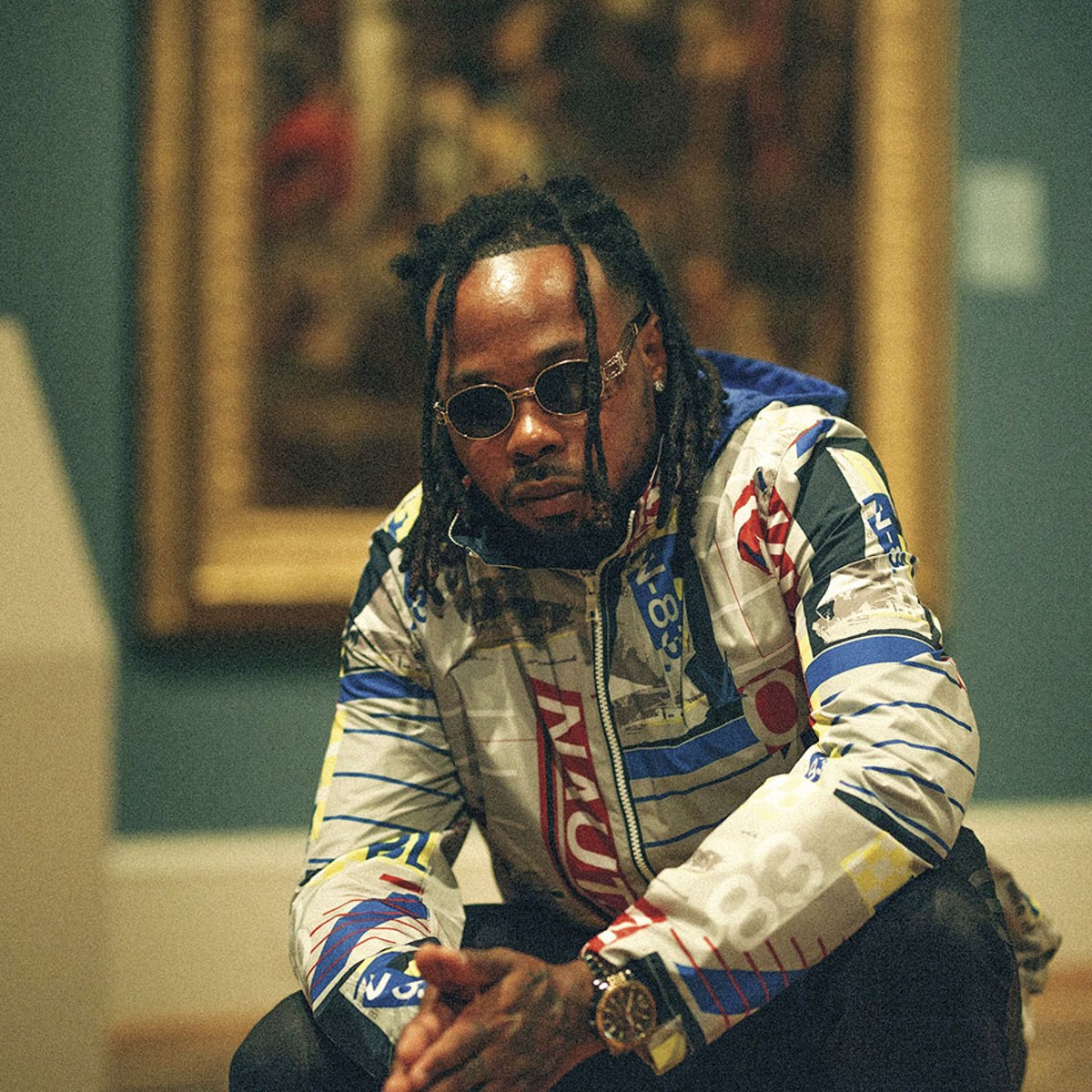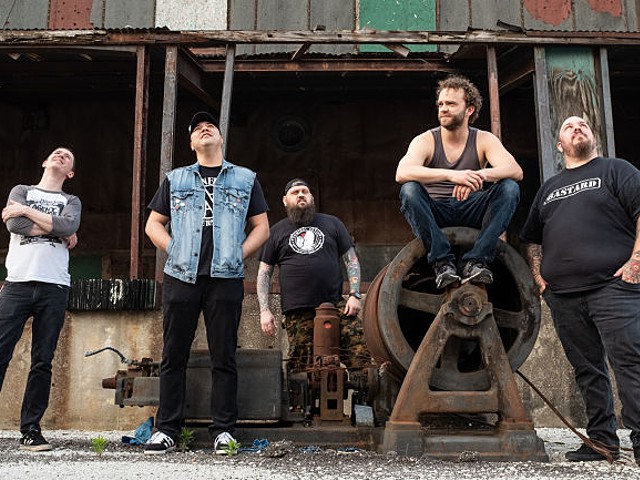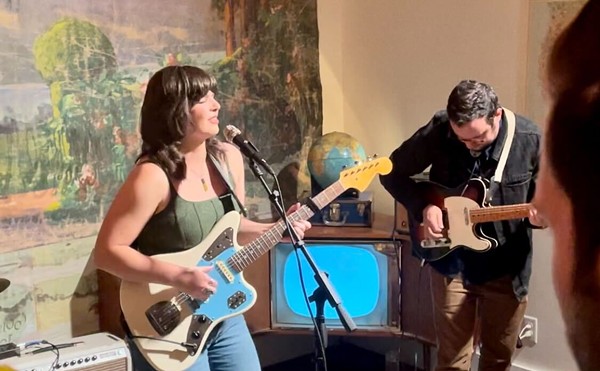St. Louis rapper and political activist T-Dubb-O is prepared to fight. And as one of the artists who faced down guns and tanks during the Ferguson protests, and who was even invited to the White House to speak on the matter, he knows exactly what that requires.
"When I say that I'm an active revolutionary in training, I mean that," the rapper born Antoine White says. "I'm willing to do anything necessary to help push my people toward liberation. Because our lives and liberty are on the line. So comfort is the last thing on my mind."
In conversation, White has an almost professorial air. He speaks quietly but authoritatively, answering most questions about himself with astute lessons on American history. In this way, he is the embodiment of the concept that the personal is political.
"Selling drugs or gang banging or getting kicked out of [North Technical High School] with a 4.0 because I was a victim of the school to prison pipeline, these are things that I went through that made me who I am," he says. "But the same person that has gone through all of these challenges was able to sit and advise President Obama."
Defiance, the rapper's third studio album, draws on these experiences to create a broad portrait of his hometown. According to White, the October release "is one of the first hip-hop projects that embodies every side of urban culture in St. Louis. That means battle rap. That means lyricism. That means the streets, gang culture, drug culture. Just everything that the city encapsulates." And starting early this year, White is taking this epic vision to the rest of the country with a national tour spanning from Los Angeles to Atlanta.
For White, this kind of success is a form of resistance — a theme that runs throughout the new material. On the dark, synth-driven "Debo," he raps, "God bless anybody go against me / I made diamonds out of coal then I lit me." The rapper's thick St. Louis drawl makes the hook soft and sticky, but the message is clear — pain only makes T-Dubb-O stronger.
"Most of my friends are dead or in jail," he notes. "Technically I'm not supposed to be here right now. So every breath I take is defiance."
That sense of triumphing over adversity is well earned. In a nation where young black men are more likely to die by homicide than from any other cause, White grew up in one of the epicenters of American violence. Raised in north St. Louis, he says that most of his cousins were involved in the drug trade. The older boys sometimes enlisted White to help with small errands, and in exchange, they gave him a cut of their profits. "I wanted Jordans and new games and new clothes," he admits, "and my mom can't afford it. But it's plenty of entrepreneurship opportunities out there."
Despite the fact that he was already writing and producing his own music, he eventually joined the Crips — a decision that he stands behind to this day. "It's actually an organization that was started to protect the black community from issues that continue to plague it, like predatory policing," he says. While the gang went through a period of turmoil during the crack epidemic, White still believes that "what it stands for is a positive thing. It's protect your community, uplift your community, look out for your people and represent them the right way."
As an artist, White puts his encounters with drugs and violence at the center of his music. But unlike some rappers, he refuses to glorify those aspects of his past. He understands that, for many young people, hustling is the only job available — a way to support themselves and their families. When it comes to making money, he says, "I can tell you the best way to go about everything. And I can tell you how to set up yourself to get out." But he warns, "You're going to hate yourself. You're going to lose a lot of people you love. And you're not going to want to live anymore."
On "Made for This," one of the most fully realized tracks on Defiance, the rapper summarizes this narrative in four short bars. Over a fragile piano line and stuttering, jazz-inflected drums, he spits, "This shit impossible where I'm from / so we choose crime / most my friends dead or jailed for a long time / but I'm strong inside." A seemingly omnipresent gospel choir only heightens the sense of urgency in T-Dubb-O's delivery. The result is powerful enough to move any listener to action.
The recently released video for "Eat Your Words," another standout track, makes the mental health consequences of violence even clearer. The piece follows White in the aftermath of a shooting — the rapper chanting "you gonna eat your words, you gonna eat your words / I got everything you said I didn't deserve" to his reflection in the mirror. The video ends with T-Dubb-O putting a gun to his own head. "Being a young black male walking around this city," he says, "we don't have any expression for the trauma we face."
In 2014, White took these issues to the streets of Ferguson, where he joined Tef Poe (born Kareem Jackson) and other in the hip-hop community on the frontlines of the protest. A battle rapper with a national following, he was eventually invited to the White House. Over a series of meetings with former President Barack Obama, he expressed his concerns with the administration's handling of predatory policing, sentencing disparities for drug crimes and the transfer of high-powered military equipment to civilian law enforcement. In the process, he became a central figure among a new generation of activists.
When he returned to St. Louis, he helped to establish Hands Up United, a human rights organization that funds a variety of initiatives throughout the city. More recently, White began working with the Drug Policy Alliance to curb the opioid epidemic in Missouri. He advocates against flooding the streets with products like Naloxone: "You're basically telling somebody, 'Okay. Go do as much dope as you can. And we're going to bring you back to life if you overdose.'" Instead, he wants to see more economic development and mental health support in communities of color.
While White is excited about Defiance and the upcoming tour, he is increasingly looking toward a future in politics. At the moment, he is contemplating a challenge to Mayor Lyda Krewson, running on a platform of criminal justice reform and violence prevention. "I don't know if God put me here for something specific," he laughs. "But I know that I'm still learning and still growing."
And as always, he's using that journey to fight for the people of St. Louis.






